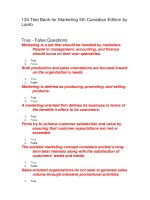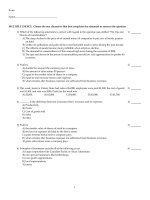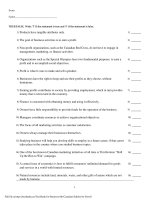kupdf com test bank for criminology 2nd canadian edition by adler
Bạn đang xem bản rút gọn của tài liệu. Xem và tải ngay bản đầy đủ của tài liệu tại đây (164.57 KB, 7 trang )
Page 1 of 7
This chapter has 45 questions.
0
Scroll down to see and select individual questions or
narrow the list using the checkboxes below.
questions at random and
keep in order
Multiple Choice Questions - (25)
Gradable: manual - (10)
True/False Questions - (10)
Learning Objective: 01-01 Discuss some of the ways in which the boundaries of criminology change - (5)
Essay Questions - (10)
Learning Objective: 01-02 Explain why criminology can be described as multi-disciplinary - (8)
Odd Numbered - (23)
Learning Objective: 01-03 Discuss the various influences on the creation of law - (11)
Even Numbered - (22)
Learning Objective: 01-04 Discuss the elements common to all crimes - (5)
Bloom's: Analyze - (1)
Learning Objective: 01-05 Explain how a defence can negate one or more of the elements of a crime - (5)
Bloom's: Apply - (1)
Learning Objective: 01-06 Outline the influences on law-breaking behaviour - (1)
Bloom's: Remember - (30)
Learning Objective: 01-07 Discuss how society deals with lawbreakers - (6)
Bloom's: Understand - (13)
Learning Objective: 01-08 Describe how criminologists influence policy changes - (4)
Gradable: automatic - (35)
1. Which of the following would NOT be considered a criminal act?
→ A sleep walker, in a trance, throws a rock at someone and injures them
A woman kills her abusive partner
A convicted sex offender does not register with the police when the court requires them to do so
A drunk person who "blacks out" and kills someone
Bloom's: Understand
Multiple Choice Question
Gradable: automatic
Which of the following would NOT be considered a c... Learning Objective: 01-04 Discuss the elements common to all crimes
2. People who are passionate about a cause and who use their political, economic, or educational influence to raise awareness
about an issue are called _____.
journalists.
politicians.
→ moral entrepreneurs.
lawyers.
Multiple Choice Question
People who are passionate about a cause and
who us...
3. The legal term for intent is:
actus rea
actus reus
mens reus
→ mens rea
Bloom's: Remember
Gradable: automatic
Learning Objective: 01-01 Discuss some of the ways in which the boundaries
of criminology change
Bloom's: Remember
Multiple Choice Question
Gradable: automatic
The legal term for intent is:
Learning Objective: 01-04 Discuss the elements common to all crimes
4. When a person consciously risks causing a prohibited harm, this is referred to as:
negligence
failure to act
→ recklessness
intent
Bloom's: Remember
Multiple Choice Question
Gradable: automatic
When a person consciously risks causing a prohibit... Learning Objective: 01-04 Discuss the elements common to all crimes
5. Breaking into a warehouse and "stealing" life-saving supplies and equipment in order to save lives following a hurricane is
defendable on the grounds of:
self-defence
provocation
duress
→ necessity
Bloom's: Remember
Multiple Choice Question
Gradable: automatic
Breaking into a warehouse and stealing life- Learning Objective: 01-05 Explain how a defence can negate one or more of the
savi...
elements of a crime
6. Under the defence of insanity, when an offender commits a crime but does not appreciate the wrongfulness of the act, the
legal element of ____________ is said to be missing.
→ mens rea
actus reus
status
concurrence
Multiple Choice Question
Under the defence of insanity, when an
offender co...
Bloom's: Remember
Gradable: automatic
Page 2 of 7
Learning Objective: 01-05 Explain how a defence can negate one or more of
the elements of a crime
7. Which of the following is considered a "partial defence"?
automatism
self-defence
→ intoxication
duress
Bloom's: Remember
Multiple Choice Question
Gradable: automatic
Which of the following is considered a
Learning Objective: 01-05 Explain how a defence can negate one or more of the
partial de...
elements of a crime
8. NCRMD stands for:
Not criminally responsible on account of mental defect
→ Not criminally responsible on account of mental disorder
Not criminally responsible on account of mental disruption
Not criminally responsible on account of mental disease
Bloom's: Remember
Multiple Choice Question
Gradable: automatic
NCRMD stands for:
Learning Objective: 01-05 Explain how a defence can negate one or more of the elements of a crime
9. Who initially coined the term criminology in 1885?
Cesare Lombroso
→ Raffaele Garofalo
Enrico Ferri
Paul Topinard
Bloom's: Remember
Multiple Choice Question
Gradable: automatic
Who initially coined the term criminology in
Learning Objective: 01-02 Explain why criminology can be described as
1885?
multi-disciplinary
10. Edwin H. Sutherland mandated that criminologists, like all other scientists, collect information for study and analysis in
accordance with
→ the research methods of modern science.
history.
the law.
what the research design will allow.
Bloom's: Remember
Multiple Choice Question
Gradable: automatic
Edwin H. Sutherland mandated that
Learning Objective: 01-02 Explain why criminology can be described as
criminologists, ...
multi-disciplinary
11. Who generated the most widely accepted definition of criminology?
Cesare Beccaria
→ Edwin Sutherland
Cesare Lombroso
Raffaele Garofalo
Bloom's: Remember
Multiple Choice Question
Gradable: automatic
Who generated the most widely accepted
Learning Objective: 01-02 Explain why criminology can be described as
definition ...
multi-disciplinary
12. Canadian criminologists are faced with a number of factors that make Canada unique as compared to the United States,
including
a higher rate of violent crime than the US.
a higher rate of incarceration than the US.
a harsher justice system generally than the US.
→ differences in values and belief systems.
Bloom's: Remember
Multiple Choice Question
Gradable: automatic
Canadian criminologists are faced with a number
Learning Objective: 01-02 Explain why criminology can be described as
of...
multi-disciplinary
13. Natural-law philosophers believed that
→ some forms of behaviour are innately criminal.
homicide and theft should not be universally condemned.
no behaviours are condemned by all societies.
there is no universal rightness or wrongness of certain human behaviour.
Multiple Choice Question
Natural-law philosophers believed that
Page 3 of 7
Bloom's: Remember
Gradable: automatic
Learning Objective: 01-03 Discuss the various influences on the creation of law
14. All early societies punished acts that were detrimental to their existence, such as
homicide.
→ treason.
theft.
vandalism.
Bloom's: Remember
Multiple Choice Question
Gradable: automatic
All early societies punished acts that were
Learning Objective: 01-03 Discuss the various influences on the creation of
detrim...
law
15. Which of the following is considered to be the earliest complete legal code in existence?
the Roman Law of the Twelve Tables
Egyptian law
the Latin law of mala prohibita
→ the Babylonian Code of Hammurabi
Bloom's: Remember
Multiple Choice Question
Gradable: automatic
Which of the following is considered to be the
Learning Objective: 01-03 Discuss the various influences on the creation of
ear...
law
16. According to Emile Durkheim, an act can be considered criminal if it violates or offends the
criminal law.
civil law.
→ collective conscience.
natural law.
Bloom's: Remember
Multiple Choice Question
Gradable: automatic
According to Emile Durkheim, an act can be
Learning Objective: 01-03 Discuss the various influences on the creation
conside...
of law
17. The consensus model of law assumes that
→ members of society by and large agree on what is right.
the appropriate object of criminological investigation is conflict within society.
the criminal justice system is a means of controlling the classes that have no power.
the criminal law expresses the values of the ruling class in a society.
Bloom's: Remember
Multiple Choice Question
Gradable: automatic
The consensus model of law assumes that
Learning Objective: 01-03 Discuss the various influences on the creation of law
18. Criminologists distinguish between which two conflicting perspectives on the origin of criminal law?
political and scientific
sociological and psychological
criminological and criminal justice
→ conflict and consensus
Bloom's: Remember
Gradable: automatic
Learning Objective: 01-03 Discuss the various influences on the creation
of law
Multiple Choice Question
Criminologists distinguish between which two
confl...
19. The conflict model of law assumes that
the appropriate object of criminological investigation is conflict within a society.
the criminal law expresses the values of the ruling class within a society.
members of a society by and large agree on what is right.
→ both a and b
Bloom's: Remember
Multiple Choice Question
Gradable: automatic
The conflict model of law assumes that
Learning Objective: 01-03 Discuss the various influences on the creation of law
20. Criminology in Canada is usually a subdiscipline of:
→ sociology
economics
political science
psychology
Multiple Choice Question
Criminology in Canada is usually a
subdiscipline o...
Bloom's: Remember
Gradable: automatic
Learning Objective: 01-02 Explain why criminology can be described as
multi-disciplinary
Page 4 of 7
21. The term "criminal justice system" is
a term coined in 1887.
→ relatively new.
a European term.
synonymous with the term "criminology."
Bloom's: Remember
Multiple Choice Question
Gradable: automatic
The term criminal justice system is
Learning Objective: 01-07 Discuss how society deals with lawbreakers
22. Scientists who study the criminal justice system are referred to as
sociologists.
criminologists.
criminalists.
→ criminal justice specialists.
Bloom's: Remember
Gradable: automatic
Learning Objective: 01-07 Discuss how society deals with lawbreakers
Multiple Choice Question
Scientists who study the criminal justice system a...
23. Criminology generally focuses on the study of
decision-making processes.
the efficiency of the criminal justice system.
correctional systems.
→ criminality.
Bloom's: Remember
Multiple Choice Question
Gradable: automatic
Criminology generally focuses on the study of
Learning Objective: 01-07 Discuss how society deals with lawbreakers
24. Criminal justice generally focuses on all of the following areas except
the just treatment of offenders.
the needs of victims.
→ crime.
the effect of sentencing philosophy.
Bloom's: Remember
Multiple Choice Question
Gradable: automatic
Criminal justice generally focuses on all of the f...
Learning Objective: 01-07 Discuss how society deals with lawbreakers
25. Approaches to crime based on "right wing" ideology are mainly focused on:
rehabilitation
→ getting "tough on crime"
social welfare policy
crime prevention
Bloom's: Remember
Multiple Choice Question
Gradable: automatic
Approaches to crime based on right wing
Learning Objective: 01-08 Describe how criminologists influence policy
ideology...
changes
26. While the morals and values of a society may change, its laws remain constant.
True
→ False
Bloom's: Understand
True / False Question
Gradable: automatic
While the morals and values of a society may
Learning Objective: 01-01 Discuss some of the ways in which the boundaries
chang...
of criminology change
27. The media portrayal of crime is always evidence-based and adequately informs us of the true nature of crime and
deviance.
True
→ False
Bloom's: Understand
True / False Question
Gradable: automatic
The media portrayal of crime is always
Learning Objective: 01-01 Discuss some of the ways in which the boundaries of
evidence-ba...
criminology change
28. Raffaele Garofalo coined the term "criminology" in 1885.
→ True
False
Bloom's: Remember
True / False Question
Gradable: automatic
Raffaele Garofalo coined the term criminology Learning Objective: 01-02 Explain why criminology can be described as multiin...
disciplinary
29. Criminology is not an empirical science.
True
Page 5 of 7
→
False
Bloom's: Remember
True / False Question
Gradable: automatic
Criminology is not an empirical
Learning Objective: 01-02 Explain why criminology can be described as multiscience.
disciplinary
30. The term deviance describes behaviour that violates social norms.
→ True
False
Bloom's: Remember
True / False Question
Gradable: automatic
The term deviance describes behaviour that
Learning Objective: 01-03 Discuss the various influences on the creation
violate...
of law
31. Conflict theorists view society as a stable entity in which laws are created for the general good.
True
→ False
True / False Question
Conflict theorists view society as a stable
entity...
32. Crime has become globalized.
→ True
False
Bloom's: Remember
Gradable: automatic
Learning Objective: 01-03 Discuss the various influences on the creation of
law
Bloom's: Understand
True / False Question
Gradable: automatic
Crime has become globalized.
Learning Objective: 01-07 Discuss how society deals with lawbreakers
33. For most crimes, either the actus reus or the mens rea must be present for the act to be considered a crime.
True
→ False
Bloom's: Understand
True / False Question
Gradable: automatic
For most crimes, either the actus reus or the mens...
Learning Objective: 01-04 Discuss the elements common to all crimes
34. Mistake of fact can be used as a legal defence to a criminal charge.
→ True
False
Bloom's: Understand
True / False Question
Gradable: automatic
Mistake of fact can be used as a legal
Learning Objective: 01-05 Explain how a defence can negate one or more of the
defence to ...
elements of a crime
35. Criminologists are able to dictate national or provincial crime-control policies.
True
→ False
Bloom's: Understand
True / False Question
Gradable: automatic
Criminologists are able to dictate national or
Learning Objective: 01-08 Describe how criminologists influence policy
pro...
changes
36. Explain the similarities and differences between criminology and criminal justice.
Explanation:
Answer will vary.
Bloom's: Understand
Essay Question
Gradable: manual
Explain the similarities and differences between c...
Learning Objective: 01-07 Discuss how society deals with lawbreakers
37. Contrast the consensus model and conflict model of law and crime.
Explanation:
Answer will vary.
Bloom's: Analyze
Essay Question
Gradable: manual
Contrast the consensus model and conflict model
Learning Objective: 01-03 Discuss the various influences on the creation
of...
of law
38. Explain the similarities and differences between deviance and crime, and provide examples.
Page 6 of 7
Explanation:
Answer will vary.
Bloom's: Understand
Essay Question
Gradable: manual
Explain the similarities and differences between Learning Objective: 01-03 Discuss the various influences on the creation of
d...
law
39. Discuss Edwin Sutherland's definition of criminology and why criminology can be described as multidisciplinary.
Explanation:
Answer will vary.
Bloom's: Understand
Essay Question
Gradable: manual
Discuss Edwin Sutherland's definition of
Learning Objective: 01-02 Explain why criminology can be described as
criminolo...
multi-disciplinary
40. Explain what is meant by the statement: "The criminal law, in principle, does not penalize anyone for a status or
condition". Provide an example.
Explanation:
Answer will vary.
Bloom's: Understand
Essay Question
Gradable: manual
Explain what is meant by the statement: The crimi...
Learning Objective: 01-04 Discuss the elements common to all crimes
41. Briefly discuss five different influences on law-breaking behaviour.
Explanation:
Answer will vary.
Bloom's: Remember
Essay Question
Gradable: manual
Briefly discuss five different influences on
Learning Objective: 01-06 Outline the influences on law-breaking
law-b...
behaviour
42. Discuss the relationship between the media and public opinion or perceptions of crime. Provide examples.
Explanation:
Answer will vary.
Bloom's: Understand
Essay Question
Gradable: manual
Discuss the relationship between the media Learning Objective: 01-01 Discuss some of the ways in which the boundaries of
and pub...
criminology change
43. After reading this chapter, given what you know about the study of crime, how would you respond to the question: "Why
do we have so much crime?"
Explanation:
Answer will vary.
Bloom's: Understand
Essay Question
Gradable: manual
After reading this chapter, given what you know
Learning Objective: 01-08 Describe how criminologists influence policy
ab...
changes
44. What types of careers are available to a person trained in criminology?
Explanation:
Answer will vary.
Page 7 of 7
Bloom's: Remember
Essay Question
Gradable: manual
What types of careers are available to a person
Learning Objective: 01-08 Describe how criminologists influence policy
tr...
changes
45. Why do definitions of criminal behaviours change over time? Discuss one example of a law that has changed and why.
Explanation:
Answer will vary.
Essay Question
Why do definitions of criminal behaviours
change o...
Bloom's: Apply
Gradable: manual
Learning Objective: 01-01 Discuss some of the ways in which the boundaries of
criminology change









